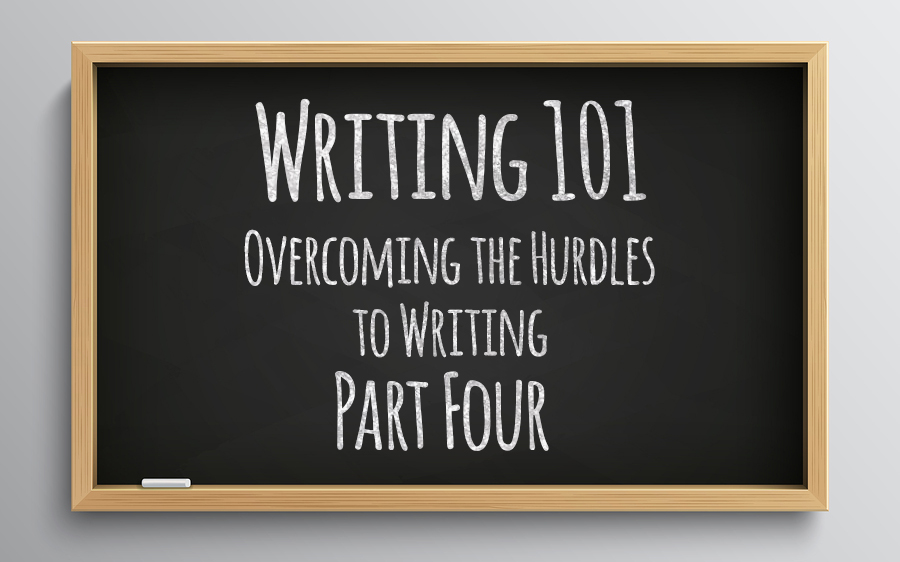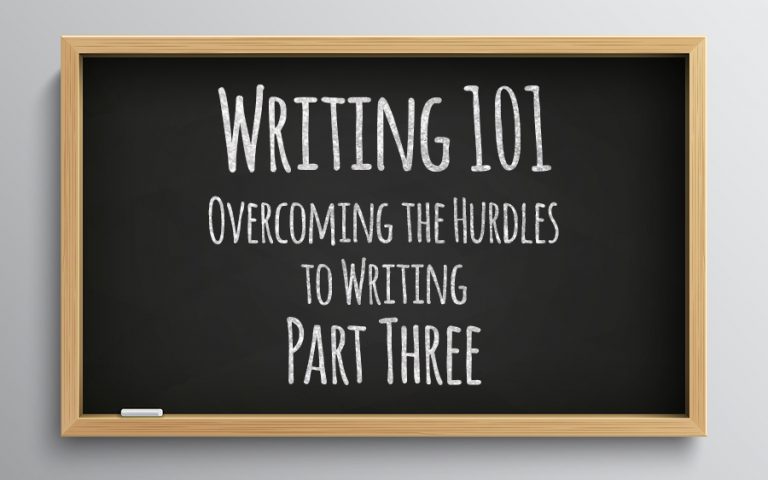Mastering Your Mind & Life: Overcoming the Hurdles to Writing – Part Four
Over the past four weeks, author Ginger has been addressing the practical and tangible issues that can prevent a writer from putting words on the page. In this final part of the series, he examines the external factors that can affect aspiring writers and offers suggestions about how to address them.
You can write any time people will leave you alone and not interrupt you. Or, rather, you can if you will be ruthless enough about it. But the best writing is certainly when you are in love.
I started this series with an Ernest Hemingway quote, so perhaps it’s fitting that I end it with one as well.
Over the past four weeks, I’ve written about the real-life, tangible issues that impact your ability to get pen to paper (or fingers to keyboard) and write. After all, you’re a writer. A writer writes. You might do other stuff as well – but as Margaret Laurence once said: “When I say work I only mean writing. Everything else is just odd jobs.”
As I mentioned earlier in the series – when I talk about this particular set of obstacles to writing, I’m not talking about intangible and esoteric issues like writer’s block or lack of inspiration – although we have written blog posts that cover those.
I’m talking about the more practical problems – finding a time to write, and having that time be peaceful and undisturbed. For most modern people it’s not easy – especially when you’re balancing a job, a family, and other commitments.
The previous three posts have been about taking responsibility for making time, doing what you need to in order to achieve that, and then how to make the time you’ve carved out for yourself more efficient. But now let’s get down to the final, uncomfortable part of this journey – the obstacles and hurdles that you face which you can’t solve yourself.
The inspiration for this series came from my own challenges last year. I was thrust into writing full-time and by some incredible stroke of good fortune, I also managed to write my first best-seller at the time. I was suddenly faced with the incredible opportunity to become a full-time writer and still enjoy the income I had when I’d been working full time…
…only I realized this in June, when the kids were about to be released for their summer vacation. We didn’t have the money to send them to camp, my wife was working full time, so it was up to me to be responsible for the kids each and every day and try to continue the momentum of a successful writing career.
They were the toughest two months of my life and I was constantly struggling to balance writing and being a good parent. I didn’t want to neglect my kids or stick them in front of a video game all day – but, at the same time, I needed to spend time writing.
And as you know – writing isn’t easy. It’s not like doing the ironing. It takes intense mental focus and you have to take yourself into another ‘zone’ to write effectively; and you literally can’t do that if you’re interrupted every five seconds by little people pleading oh-so-adorably: “Please will you play with me, Daddy?”
This is how I got into waking at 5am every day – because it was literally the only time I was able to write. It was also the moment I realized that other writers might value what I learned about how to deal with this situation.
So, let’s go through some steps to address the external issues you face.
Identify Your Frustrations
One of the most powerful and effective first steps to solving your frustration was taught to me by Michael Losier’s book The Law of Attraction. Don’t worry if you’re a skeptic of the LoA – this isn’t some esoteric hippy stuff. This is one of the most powerful and effective tools you can use to identify what issues you face, and start thinking about how to overcome them.
In this book, Losier suggests something called “clarity through contrast” – in which you focus on what your problems are, and then use that to figure out how you’d like life to be instead.
The first step is to write a list of your frustrations – a LONG list. He actually suggests writing 50 or more things that make you frustrated about your life. In those summer months, I undertook this exercise and these are some examples of the things I wrote:
- I’m frustrated because my house is a mess and it’s distracting and I can’t focus on what I want to do because of it.
- I’m frustrated because I feel like I never have enough time to write, and when I sit down to write I am constantly interrupted by my kids, wife or the dogs and it makes writing almost impossible.
- I am always swamped with small projects to complete that don’t bring in very much money, and I don’t have time to do the writing that promises a more secure and stable income in the future.
These were very real and valid frustrations, and you’ll find an incredible cathartic power in simply putting them down on paper. Seriously, even if you don’t manage to come up with 50, just writing a list of how you feel is like therapy in and of itself.
The important thing is to start it all off with emotion – how you feel. “I’m frustrated by…” or “I’m annoyed by…” and this goes back to something we wrote about in part one of this series – the ‘locus of control’ – the understanding that there are some things in your life that you have control over. So while you can’t control all external situations or issues, what you can control is how you react to them. By doing this project you’ll likely find that one of the biggest sources of frustration in your life isn’t the constant interruption or chaos, but your reaction to it.
After you’ve completed your list, it’s time to go through it and identify what it is you’d like instead. You’re using ‘contrast’ (as in, the opposite) to provide ‘clarity’ in what you desire.
For example, I wrote:
- I’m frustrated because my house is a mess and it’s distracting and I can’t focus on what I want to do because of it.
And my answer to that is:
- I want my house to be organized, and tidy, and seem like a comforting space that makes me feel focused.
Next is the REALLY powerful part of this. Take that statement and turn it into a present-tense declaration – as if it’s already happening. And make sure you start it with an emotion, because that’s how you feel about things.
- I live in an organized, clean, fresh-smelling house which is effortless to maintain and gives me an atmosphere which helps encourage and focus me to be creative.
Now, listen, I know what you’re thinking – this sounds like a load of hippy crap, right? But trust me – TRUST ME – it works. In fact, this is one of the most powerful tools I’ve ever encountered for getting myself back on track. I’m not sure whether it just helps focus my mind on what I truly desire, or whether it does work some existential magic, but it works.
The most powerful part of it is identifying what makes you unhappy – because you can be unhappy without having a clear understanding of why. Once you identify the specific problem, you can address solving it – and that’s the first step to ending your unhappiness. It’s like a journey – you’ll never arrive unless you know the destination. Likewise, you can never make yourself happy unless you identify what’s making you miserable.
Ask for Help
This is the second stage of the process, and perhaps the most important.
Once you identify all the causes of your frustration, it’s time to address them – and you might find many are ones you can solve yourself. For example, I was frustrated by not having a clean house which would inspire creativity, so I took to doing the vacuuming, ironing and cleaning while brainstorming ideas for my stories. Believe it or not, this actually helped the creative process – because these boring, repetitive and mindless tasks are almost like meditation. They can help channel your focus and ideas – and your house gets tidier, too!
It helped that I’d read this quote from Marie de Narvaud, which helped me not feel guilty about writing at that second, because I was still brainstorming:
“You don’t actually have to write anything until you’ve thought it out. This is an enormous relief, and you can sit there searching for the point at which the story becomes a toboggan and starts to slide.”
But in this step, we’re looking specifically at the issues we cannot solve on our own.
In my particular case, it was the fact that looking after the kids dominated my time, and created an environment in which I couldn’t effectively write. I was aiming a lot of this frustration at my kids, and harboring a lot of resentment towards my wife, who I felt could be ‘doing more.’
But by going through the ‘clarity through contrast’ process, I identified which areas I needed help with and I actually took the steps to talk to my wife about it – something astonishingly obvious, but which I hadn’t tried yet.
And note I say “talk” and not “yell” or “argue” – since that will guarantee a negative reaction!
I spoke to my wife about my frustrations, and she in turn spoke about the demands of her job and what she’d like from me. It allowed me to see her perspective, and her to see mine – and it was incredibly cathartic even if it wasn’t especially productive. In the end, we figured out that we had a much more equitable split of labor than I’d thought. I might have been the ‘breadwinner’ and paid the bills, but she needed to work for her nursing degree, and for the health insurance, and to pursue her own career ambitions – which (and this is important) are no less valid than my own!
But she did make an effort to take the kids off to do ‘mommy’ activities with them, which the kids enjoyed (and gave me some much-needed writing time.) She also helped out more where she could. But, more importantly, she identified ways in which I was getting frustrated with having to do things that I really didn’t have to do at all.
For instance, I’d got into the habit of making her scrambled eggs in the morning, or running to get something for the kids even though she was sitting closer. She made me realize that if I stopped volunteering to do things for her that she didn’t ask me to it would help give me more time and quiet. Once again, this was a matter of the ‘locus of control’ that I hadn’t accepted.
I asked the kids to help, too – being clearer about when Daddy needed to be left alone, and then balancing it out by spending different periods focused entirely on them. Three hours of uninterrupted writing time was much more productive than six hours of constant kid-related distractions, and the kids enjoyed three hours of focused-daddy-attention more than six hours of half-hearted ‘supervision’ while they colored or played video games.
As Robin S. Sharma advises:
“Three hours of focused time on the projects that will really add value and uplift your career are so much better than 10 hours where you are constantly being interrupted and taken off your focus.”
Take Responsibility
At the end of the day, I think the most important message of this series is: You have the power.
Only you have the power to figure out what you need in order to succeed as a writer, and only you have the power to make the decisions and talk to the people who can help make it happen.
You can’t allow yourself to wallow in frustration, resentment or blame. The people who might well be the biggest cause of frustration – your family and kids – are probably your biggest cheerleaders, and would be heartbroken to know you blame them for your difficulties.
So – don’t.
Take responsibility for yourself, and your writing, and talk to them about how you can both do better for each other.
These are the most important steps to achieving the situation you need in order to be successful; but the secret is that you’ve had the power to do so all along.












1 Comments